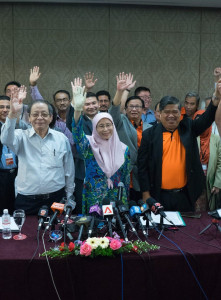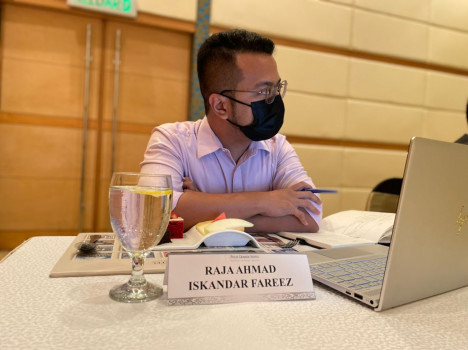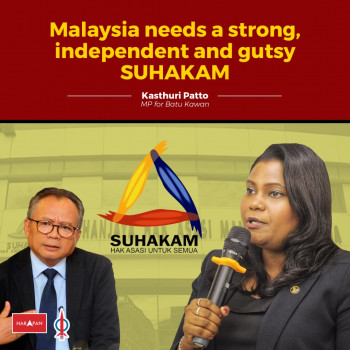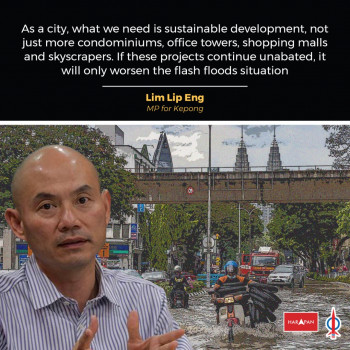By Ong Kian Ming, DAP Serdang MP
How will history judge the third attempt at forming an opposition coalition in Malaysia? Only time will tell. But the newly formed Pakatan Harapan face considerable challenges in preparing to face the Barisan Nasional (BN) in the fight for the nation’s future in the next general election. At the same time, there are also opportunities to be grasped in shaping the identity and platforms for the new coalition.
In this first part, I will go through some of the challenges of forming this new opposition coalition and argue that this is the right time to launch Pakatan Harapan. In part two, I will outline some of the challenges and opportunities for Pakatan Harapan in preparing for the next general elections.
While the announcement of the formation of Pakatan Harapan by opposition leader and PKR President, Dr. Wan Azizah, together with DAP parliamentary leader Lim Kit Siang and Parti Amanah Negara Chairman Mat Sabu seemed like a done deal, there were many forces that were moving behind the scenes to delay or even scupper the formation of this new opposition coalition. Some of this was driven by genuine motivations, other less so.
Arguments against the formation of Pakatan Harapan
The arguments made against the formation of a new opposition coalition can be grouped largely into three categories with some overlaps between them.
The first argument revolves around the notion that because a BN-Najib will be so unpopular heading into the next general election that all the opposition parties need to do is to avoid three corner fights in order to get to Putrajaya. Including Amanah but excluding PAS from a new opposition coalition would likely lead to some damaging three corner fights that would detract from this larger objective. Hence, the opposition parties should maintain the status quo and not rock the boat.
The problem with this argument is that GE2018 (assuming the BN Prime Minister goes full term) will be different from GE2008. Winning a majority of parliament seats is a different ballgame compared to denying the BN a two thirds majority. The expectations of the rakyat have changed together with the political landscape in the country. If there is no official opposition coalition with a concrete platform and manifesto, some voters may just opt to stick with the familiarity of the BN, enough to deny an opposition victory. We also cannot discount the possibility that voter turnout will be lower than in GE2013 if voters do not see a viable opposition coalition to take over the BN. This will inevitably hurt the opposition more than it hurts the BN.
Furthermore, this argument is predicated on Najib remaining as Prime Minister. What if, for some unexpected reason, Najib is replaced by a rejuvenated and invigorated Muhyiddin prior to GE2018? A Muhyiddin led BN would benefit from a Pak Lah GE2004 boost to its popularity. The opposition parties would then have to scramble, in an uncoordinated manner, to try to find an effective counter to this. With a new opposition coalition in place, we would be in a much better position to plan and prepare for such a possibility and to show how we can do better than the BN, regardless of whether it is a Najib-led, Muhyiddin-led, Zahid Hamidi-led, or Khairy-led BN.
The second argument against the formation of an opposition coalition revolves around the fear of alienating PAS and losing the Malay vote. The notion here is that PAS is the only opposition party that can reach out to the Malay rural heartland and if they are excluded from the opposition coalition, this voter base will also abandon a PAS-less Pakatan Harapan. A further extension of this argument is that excluding PAS will push the party closer towards working with UMNO thereby decreasing the chances for an opposition victory in the next general election.
Again, this argument is problematic from many angles. The assumption that only PAS can win or hold on to the rural needs to be re-examined. Of the 15 parliament seats which the opposition won in 2008 but failed to defend in 2013, 10 were in the PAS stronghold states of Kedah and Kelantan. 7 of these seats were lost in Kedah alone partly due to an inept PAS-led state government that failed to deliver. In contrast, Pakatan in Penang as well as Selangor made gains in GE2013 in terms of vote share. Indeed, it may be fears within PAS that it may not be able to hold on to the Kelantan state government post-Tok Guru Nik Aziz that forced it to put hudud on the agenda post GE2013. The inability of the PAS Kelantan state government to come up with any systematic post flood reconstruction and rebuilding plan may very well come back to haunt PAS in GE2018.
It is undeniable that Amanah’s ability to capture the Malay vote is still somewhat in doubt. But that is to be expected given that it is only a few months old. There are encouraging signs especially the fact that more than 8000 members have signed up in the state of Kelantan. Amanah is also expected to make a strong push in the southern states of Johor, Melaka and Negeri Sembilan, states which PAS’s presence has been traditionally seen as weak. The political support of the Malay community is fluid, just like that of the other communities. Having a new progressive Islamic party to fight for the hearts and minds of the Malay community is a positive development especially given the reluctance of the current PAS President, Tok Guru Hadi Awang, to attack the many weaknesses and shortcomings of the Najib administration.
The formation of a PAS-less opposition coalition also does not prevent a future electoral pact to be agreed upon with PAS so that three corner fights can be minimized or avoided altogether especially in the marginal seats, if PAS is willing to come to the negotiating table.
Finally, the possibility of PAS having a closer working relationship with UMNO is already apparent, with or without the formation of a new opposition coalition. It is likely that Hadi Awang will continue to be manipulated and misled by UMNO into believing that the hudud agenda in Kelantan is still a possibility with the cooperation of UMNO. Given these existing tendencies, would it not be better to force PAS to reveal its political position vis-à-vis UMNO before the next general election rather than after? What guarantees do the other opposition political parties have that a Hadi Awang led PAS will not cooperate with UMNO in a post-GE14 context even without the presence of Pakatan Harapan?
The third argument against the formation of an opposition coalition is that this is not the right time. More discussion needs to take place and the policy positions of the new coalition needs to be firmed up so that the problems which broke up Pakatan Rakyat does not lead to the breakup of any new opposition coalition. The opposition parties should also go to the ground in order to understand the rural voters and form a coalition that will be able to win their hearts and minds. These are well meaning suggestions but are politically impractical.
That fact is that the opposition has been dysfunctional since the decision by Hadi Awang to push for the hudud agenda in Kelantan which is a direct contravention of the Pakatan Rakyat Common Policy Framework. The need to fill the leadership vacuum which has been vacated by Najib is all the more pressing given the upcoming budget session in parliament, the worsening economic conditions in the country and the blatant attempts by UMNO to encourage and even organize events that raise the racial rhetoric and temperature in the country.
It would also not be fair to leave our friends and colleagues in Amanah ‘hanging’, so to speak, after making the very painful decision to leave PAS, their party of struggle for many years, and to form a new progressive Islamic party. The expectation was that Amanah would join a new opposition coalition that would provide leadership to the country in a time of need. Forming the opposition coalition at this time would give Amanah a much boost in its legitimacy and demonstrate its commitment to the opposition cause as well as confirm the commitment of the other opposition parties to its cause.
Discussions can go on endlessly without any resolutions. The fact of the matter is that the Pakatan Rakyat Common Policy Framework already established the common policy commitments of the then opposition coalition. Pakatan Harapan can adopt the same framework and tweak it as we go along in in accordance to the new political and policy challenges which we will face in the run-up to the next general election. The formation of this new opposition coalition will also allow us to present a united front in the upcoming parliamentary session including the presentation of an alternative budget, something which may not have been possible without the presence of a formal opposition coalition.
Does the formation of Pakatan Harapan means that we have answered all the arguments against new opposition coalition? I would be naïve to assume so. But it is a good first step towards the bigger and more significant fight that will come at the next general election. In the meantime, Pakatan Harapan will have to face many challenges and try to grasp the many opportunities that will come our way. That will be covered in Part 2 of my statement.




